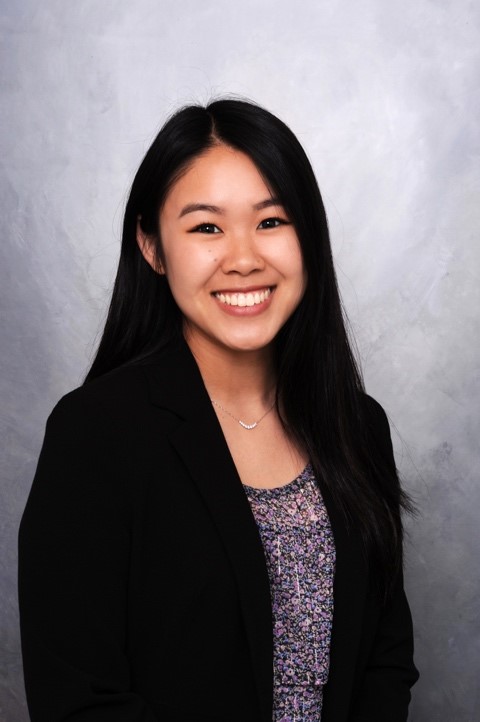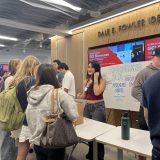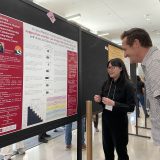Exploring Health Specialties and Health Care Systems Kiersten Chong's experience at Hawaii Pacific Health's Summer Student Research Program
September 3, 2019
 Kiersten Chong is a senior Biochemistry & Molecular Biology major with a minor in Business Administration. Since her sophomore year, she has had the opportunity to serve on the Schmid Student Leadership Council and she has also participated in the CHIN 201A summer travel course to Taiwan. She serves as a supplemental instructor for BIOL 208 and has previously tutored general chemistry and biology. Currently, she is a part of Dr. Cedric Owens’ biochemistry lab where they are studying nitrogenase, a nitrogen-fixing bacteria. Her other involvements include being a member of the hip hop group Floor 13, STEMtors, and she has served on the executive board for the Taiwanese-American Student Association.
Kiersten Chong is a senior Biochemistry & Molecular Biology major with a minor in Business Administration. Since her sophomore year, she has had the opportunity to serve on the Schmid Student Leadership Council and she has also participated in the CHIN 201A summer travel course to Taiwan. She serves as a supplemental instructor for BIOL 208 and has previously tutored general chemistry and biology. Currently, she is a part of Dr. Cedric Owens’ biochemistry lab where they are studying nitrogenase, a nitrogen-fixing bacteria. Her other involvements include being a member of the hip hop group Floor 13, STEMtors, and she has served on the executive board for the Taiwanese-American Student Association.
This past summer, Kiersten participated in Hawaii Pacific Health’s (HPH) Summer Student Research Program (SSRP) in Honolulu, HI. During this program, participants are matched by interest to a clinical research project with a principal investigator physician. These physicians are of various specialties from infectious disease to pediatric surgery. In addition to participating in clinical research, they also have the opportunity to shadow physicians, observe surgeries, visit HPH’s four medical centers, and meet with physicians and leadership. At the end of the 8-week program, participants present their research to physicians, the community, and part of the John A. Burns School of Medicine at the University of Hawaii’s admissions team. Many students go on to publish their research at the end of the program as well.

Kiersten Chong with Dr. Dawn Minaai, a geriatrician at Straub Medical Center.
Kiersten was paired with Dr. Dawn Minaai, a geriatrician at Straub Medical Center, looking at end of life options such as hospice and medical aid in dying. This required Kiersten to review Dr. Minaai’s patients’ charts to see what factors affected their choices to enter hospice or begin the process of medical aid in dying.
We talked with Kiersten about her summer experience and how it has helped with her own career exploration.
Q&A with Kiersten:
Q: What did you learn from your summer experience?
KC: “On the research end, I have learned a lot about clinical research and its life cycle. As with all research, there have been bumps in the road when it comes to data collection, communication, and big deadlines. However, I have learned how to better navigate these challenges and taught myself perseverance. Besides research, my summer research experience helped show me what populations various specialties serve and their role in providing care to patients. I found that I want to serve a wide range of patients from children to the elderly and I can achieve this through becoming a family medicine physician.”
Q: Did anything surprise you about the experience?
KC: “I was surprised to have also learned a lot about health care in Hawaii, specifically health care transformation from fee-for-service to value-based care. This transformation is a response to the rising cost of health care in an attempt to change the way health care works and eventually make it more affordable. We had the opportunity to learn about this from HPH’s CEO, Ray Vara, and Mark Mugiishi, the CMO of Hawaii’s leading health insurer, HMSA.”
Q: How has your Chapman experience prepared you for this opportunity?
KC: “I think participating in research at Chapman, even though it was not clinical research, gave me an edge over other applicants who may have not had research experience. Of the 12 SSRP scholars this summer, only one did not have previous research experience. Besides helping me get accepted, Chapman’s research experience also prepared me for the types of challenges I encounter in clinical research. Also, having opportunities to hold leadership roles and participate in the Chapman community has also helped prepare me to work well in a team with others.”
Q: How did you learn about this opportunity?
KC: “Last summer, I participated in HPH’s Health Careers Summer Internship. Through that experience, I had the opportunity to attend the presentations of that year’s SSRP scholars. The topics of their presentations piqued my interest and encouraged me to apply. I also know a couple SSRP alumni who cited the program as one of the best experiences they have had in their pre-med careers.”
Q: What was the application/interview process like?
KC: “The application consisted of a personal statement, a transcript, a resume, and 1 or 2 letters of recommendation. It is also encouraged students to have previous research experience. Interviews were done about a month after submitting the application. The interview process was untraditional in that it was done online and was a recorded video. There were two questions and each one would pop onto your screen and you had a minute to think about what you were going to say then it would start recording and you had a minute and a half to answer. Decisions were sent out about a month after interviews were done.”
Q: What advice do you have to offer Schmid students who are looking to apply to research programs in the summer?
KC: “Research programs are very competitive but very worthwhile. Start working on your application early and apply to as many programs as you can. However, be sure to not spread yourself out too thin. You want to put as much effort as you can into each application to make it worth your time.”
Kiersten has offered to be a resource to any Schmid students with questions about participating in a summer research program. You can connect with Kiersten through email or LinkedIn.


